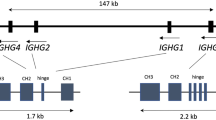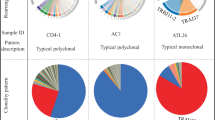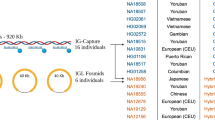Abstract
The isolation of rearranged immunoglobulin (Ig) variable region (V) genes is usually performed by PCR with consensus primers binding to conserved regions within the V sequences. However, the isolation of Ig genes by this method is hampered in 15–35% by technical difficulties, mostly mismatches of oligonucleotide primers to V sequences. In order to obtain DNA sequences from V heavy chain (VH) genes which could not be amplified with consensus primers, we used a modified PCR technique, the rapid amplification of cDNA ends (RACE) PCR in combination with new heavy chain constant region primers for the isolation of human and murine VH genes. In comparison, consensus primer PCR with different sets of previously published oligonucleotide primers was used. Both methods were applied to isolate VH genes from murine B cell lymphoma (A20 and BCL1), myeloma (NS1) and hybridoma (SP6) cell lines and from freshly isolated human chronic lymphocytic leukemia and lymphoma cells. RACE PCR allowed the amplification and subsequent cloning of the complete VH gene in all cases. In contrast, consensus primer PCR failed to isolate the VH sequence of the murine A20 cell line; this was explained by a mismatch of consensus primers with VH sequences. When both PCR methods amplified VH sequences, the DNA sequences obtained were identical. Taken together, RACE PCR represents a reliable and versatile method for the isolation of VH genes from human and murine lymphoma cells, in particular if consensus primer PCR fails.
This is a preview of subscription content, access via your institution
Access options
Subscribe to this journal
Receive 12 print issues and online access
$259.00 per year
only $21.58 per issue
Buy this article
- Purchase on Springer Link
- Instant access to full article PDF
Prices may be subject to local taxes which are calculated during checkout
Similar content being viewed by others
Author information
Authors and Affiliations
Rights and permissions
About this article
Cite this article
Doenecke, A., Winnacker, EL. & Hallek, M. Rapid amplification of cDNA ends (RACE) improves the PCR-based isolation of immunoglobulin variable region genes from murine and human lymphoma cells and cell lines. Leukemia 11, 1787–1792 (1997). https://doi.org/10.1038/sj.leu.2400781
Received:
Accepted:
Issue Date:
DOI: https://doi.org/10.1038/sj.leu.2400781
Keywords
This article is cited by
-
Characterization of myo-inositol-1-phosphate synthase (MIPS) gene expression and phytic acid accumulation in oat (Avena sativa) during seed development
Cereal Research Communications (2022)
-
Target-selective homologous recombination cloning for high-throughput generation of monoclonal antibodies from single plasma cells
BMC Biotechnology (2011)
-
Control of the specificity of T cell-mediated anti-idiotype immunity by natural regulatory T cells
Cancer Immunology, Immunotherapy (2011)
-
Degenerated primer design to amplify the heavy chain variable region from immunoglobulin cDNA
BMC Bioinformatics (2006)



